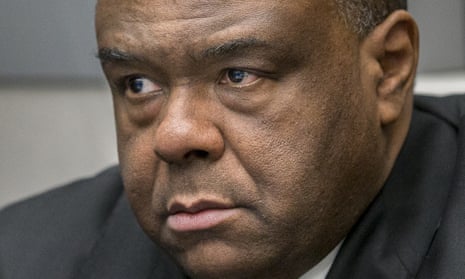The former Congolese vice-president, Jean-Pierre Bemba, has been found guilty in the first trial at the international criminal court (ICC) to focus on the use of sexual violence as a weapon of war.
The 53-year-old warlord commanded a militia that committed mass murder, rape and pillage in neighbouring Central African Republic, the court ruled at the end of his trial in The Hague for war crimes and crimes against humanity.
More than 5,000 victims were granted the right to participate in the hearings – the highest number in any of the cases before the court.
The verdicts mark the first time the ICC has convicted defendants of rape or command responsibility for the actions of their troops, a legal principle established by other UN tribunals that makes a commander responsible for failing to take action to stop crimes he knows are being committed by subordinates.
Prosecutors told the court that Bemba, who led the Congolese Liberation Movement (MLC), “knew that the troops were committing crimes and did not take all necessary and reasonable measures within his power to prevent or repress their commission”.
Bemba was convicted of two counts of crimes against humanity, involving murder and rape, as well as three counts of war crimes – murder, rape and pillaging – all connected to attacks in CAR between 2002 and 2003. His troops had entered the country to prop up the president, Ange-Félix Patassé, who was eventually ousted.
The presiding Brazilian judge, Sylvia Steiner, said MLC soldiers had opened fire on civilians without regard to age or gender. “The civilian population was the primary rather than the incidental target of the attack,” she said in her judgment.
In a graphic description of the attacks, Steiner said: “MLC soldiers by force knowingly and intentionally invaded the bodies of the victims by penetrating the victims’ anuses, vaginas or other bodily openings with their penises.” On occasions family members were forced, at gunpoint, to watch.
Bemba, who fled the Democratic Republic of the Congo after losing a presidential poll, was arrested in Belgium in 2008 and transferred to the ICC’s detention centre in The Hague. His trial started in November 2010 and lasted four years. It heard from 77 witnesses.
His defence lawyers insisted he had no control over his 1,500 troops. “There is not a single documentary piece of evidence that shows any orders passing from Bemba and going to his troops in Central African Republic,” Kate Gibson, representing him, said in her closing argument.
Bemba, dressed in a suit and burgundy tie, sat at the back of the court, occasionally shaking his head, as Steiner detailed the atrocities for which he was responsible. He will be sentenced at a later hearing.
Amnesty International said the guilty verdict against Bemba was a “historic moment in the battle for justice” for victims of sexual violence in CAR and around the world.
“It sends a clear message that impunity for sexual violence as a tool of war will not be tolerated,” said the group’s west and central Africa director, Samira Daoud. “It also makes clear that military commanders and political superiors must take all necessary steps to prevent their subordinates from committing such heinous acts and will be held accountable if they fail to do so.”
Angelina Jolie Pitt, co-founder of the Preventing Sexual Violence Initiative, said in a statement issued through the UK Foreign Office: “My thoughts and my admiration go out to the survivors and witnesses who bravely testified in this case and contributed to this landmark conviction. I can only imagine the reaction of victims who in their hearts probably never thought that this day would come.
“It is shocking that this conviction is the first of its kind. It is a reminder of how long it has taken us to reach this point, and how many victims have never seen justice.”
Karine Bonneau, international justice director at the Paris-based International Federation of Human Rights (FIDH), which supported victims from Central African Republic at the trial, welcomed the decision.
“There were more than 1,000 rapes,” she said. “This is the first time that the ICC has convicted anyone of command responsibility. It’s very important that the people who gave the orders should be held responsible.
“It will now be up to the court to determine reparations and restitution. They may be more medical and psychological support for the victims as well as compensation.” Bonneau was critical, however, of the two years it had taken the court to deliver its verdict. “Two years is too long,” she added.
The convictions will be a boost for the court’s prosecutor Fatou Bensouda, who has made the fight against sexual assault in conflict one of her priorities.
Descartes Mponge, secretary general of Congolese rights group ACADHOSHA, said the judgment “strengthens the ICC’s credibility in Africa where it is accused of bias and politicisation”.
James Goldston, executive director of the Open Society Justice Initiative in New York, said: “The guilty verdict marks another important milestone for the ICC, both in dealing head-on with the issue of sexual violence in war, and in making clear the responsibility of military commanders for the actions of those under their command.”
Bemba and four others are also on trial in a second case in which they are accused of bribing witnesses in his main trial. He will be sentenced after a separate hearing.








